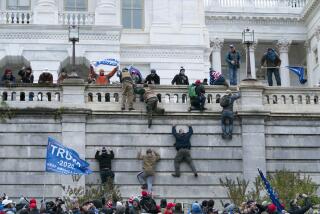Revolutionaries Boot Up to Take Fight From the Streets to Computer Screens
NEW YORK â More than once, Koigi wa Wamwere was escorted to court in Kenya by as many as 20 police vehicles and 100 soldiers.
Each time, he was unarmed.
âWhen you see this convoy of security vehicles,â says Wamwere, a political dissident, âyou know . . . they are fighting your ideas. Ideas can be very powerful and very much feared.â
In the 1960s and â70s, dissidents in the Soviet Union used Samizdat--mimeographed tracts secretly passed hand to hand--to spread their ideas. In the 1980s, Chinese dissidents used fax machines. Now, political dissidents worldwide use the Internet. They post literature, letters and articles on Web sites so people can read their words long after their governments have banned them.
Wamwere, in the United States recently on a speaking tour, is helping to launch the Digital Freedom Network, a Web site devoted to censored material. Unlike other such sites run by human rights groups, the network is funded entirely by private donations. Howard Jonas, the CEO of IDT Corp., an international telecommunications firm, has given the network what he calls a bottomless grant so that it will never have to compromise its philosophy in order to raise money.
The Digital Freedom Network (https://www.dfn.org), one of the few Web sites for political revolutionaries that includes material from all over the world, is helping dissidents open a second front. It is joining other human rights organizations in moving political battles from parliaments and the streets onto computer screens. Local struggles are becoming international almost instantaneously, and anybody with access to the Internet can learn about them.
âWe used to think that something happened, then you took a picture of it or wrote a story, and that simply represented the event,â says Thomas Keenan, a fellow at Harvardâs Shorenstein Center for the Press and Politics. âNow, increasingly, the picture can be more important than the event itself, in political terms. The primacy of the âreal worldâ is disappearing and the virtual world is becoming a space of serious political actions and consequences.
âThe field of political struggle has broadened to include the surface of your TV screen, the contents of your hard drive or your Web browser.â
In 1994, Jonas offered free Internet access and Web hosting to a number of human rights groups. All turned him down. Some were suspicious of his motives, Jonas says, and others felt that if they took his money, then foundations would reject their requests for grants. â[Most of] these people have families to support,â Jonas says. âAnd they become more concerned with preserving their position within their own human rights organization and their organizationâs place within the constellation of the community.â
So Jonas hired his own staff to do what some human rights groups do: offer Web server space, manage Web sites and provide e-mail. The Digital Freedom Network gathers most of its material from other organizations: the Committee to Protect Journalists, the Index on Censorship, Reporters sans Frontieres and the Network for the Defense of Independent Media in Africa. Many of these groups, says Bobson Wong, president of the Digital Freedom Network, lack the resources to post this material on-line, and several of them concentrate only on a particular area.
âPeople who fight tyranny in different countries often fight the same battle,â Wong says. âDFN hopes to bring these people from around the world together and get them to speak as one voice. . . . Itâs one thing to say that thereâs one dissident somewhere who is protesting a particular government. Itâs another thing to say that there are people from all over the world that think that a particular government is violating peopleâs human rights.â
The Digital Freedom Network does not intend to stop there. Jonas also wants to start an education fund for dissidents who have been released from prison. âMany of these dissidents have lost some of the most productive years of their lives, and itâs hard to get a fresh start,â he explains.
Bill Orme, executive director of the Committee to Protect Journalists, believes that groups such as the Digital Freedom Network are having an effect on policies in the United States, the European Union and Canada.
Ursula Owen, editor of Index on Censorship, is more skeptical. âThere is always more pressure if there is more information,â she says, but she adds that physical struggles still have more impact than what appears on computer screens. âPeople can choose what they look at [on the Internet],â she says. âIf you donât want to look at what your enemy is saying, you donât have to. But if there are battles on the street, you have to address it.â
More to Read
Sign up for Essential California
The most important California stories and recommendations in your inbox every morning.
You may occasionally receive promotional content from the Los Angeles Times.










